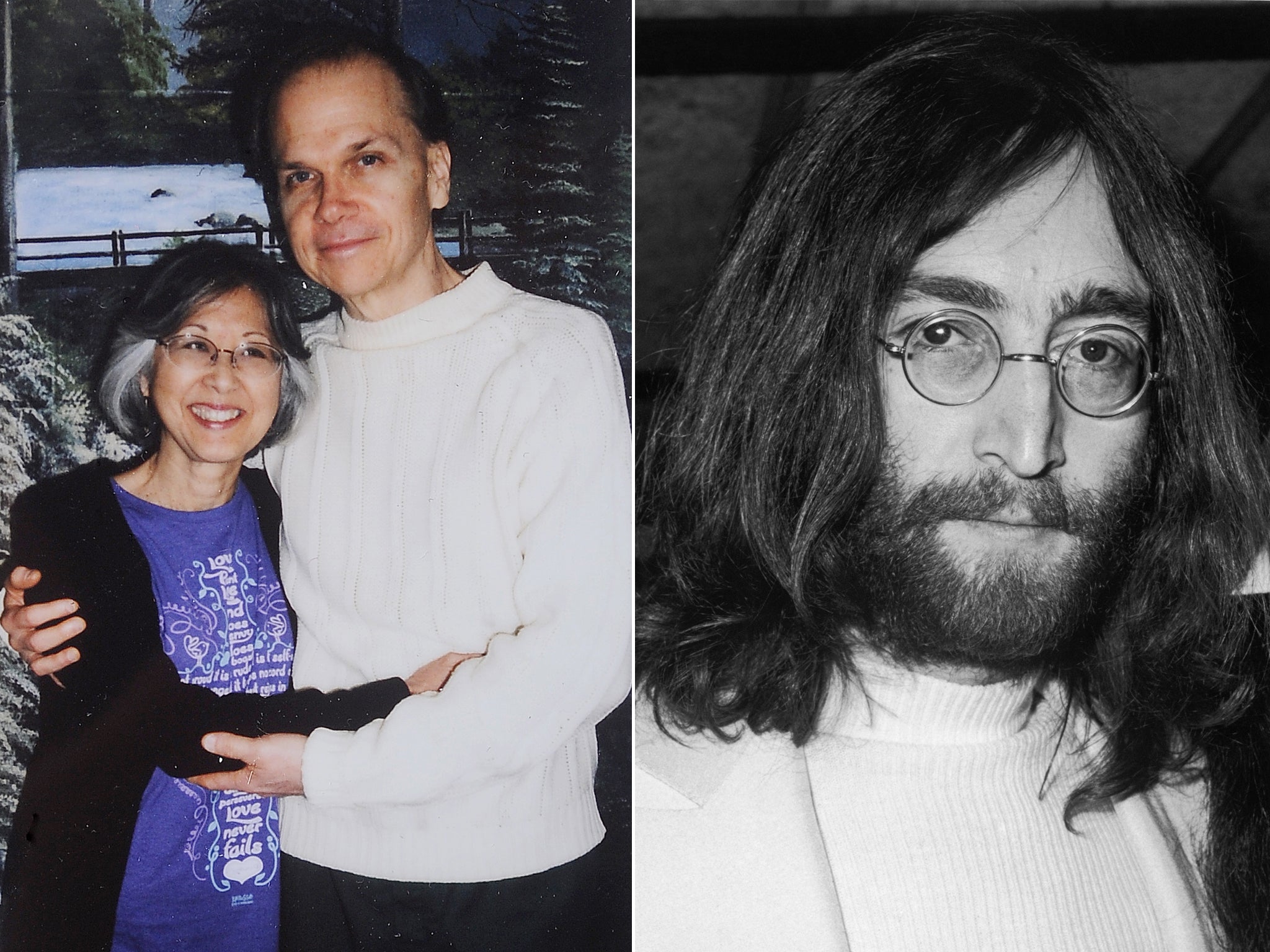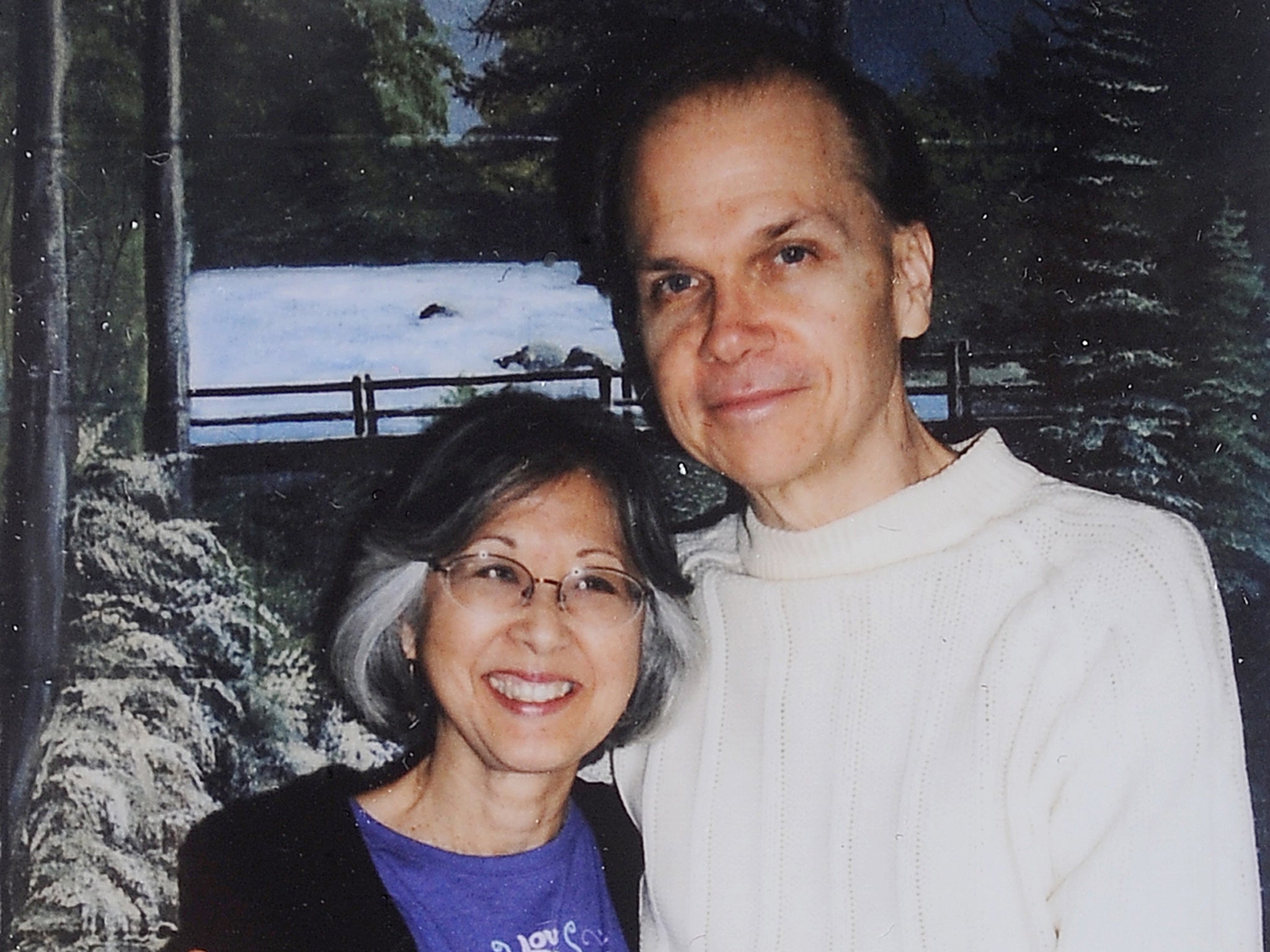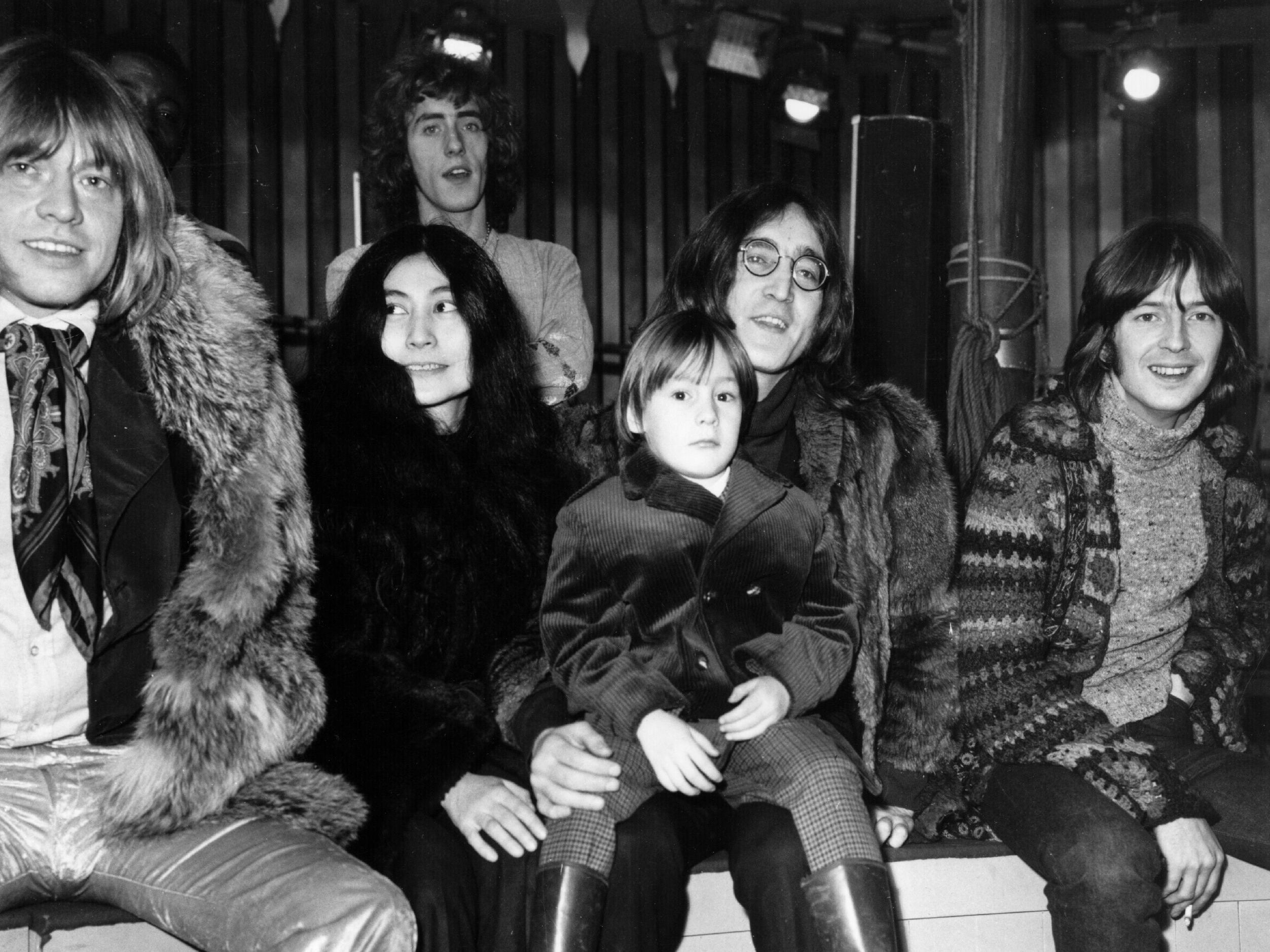Mrs Mark Chapman: 41 years standing by the man who killed John Lennon
Mark David Chapman’s wife, Gloria, has stood by him since the night he shot Lennon amid 41 years of criticism, now a new play puts her in the spotlight. Sheila Flynn writes

Your support helps us to tell the story
From reproductive rights to climate change to Big Tech, The Independent is on the ground when the story is developing. Whether it's investigating the financials of Elon Musk's pro-Trump PAC or producing our latest documentary, 'The A Word', which shines a light on the American women fighting for reproductive rights, we know how important it is to parse out the facts from the messaging.
At such a critical moment in US history, we need reporters on the ground. Your donation allows us to keep sending journalists to speak to both sides of the story.
The Independent is trusted by Americans across the entire political spectrum. And unlike many other quality news outlets, we choose not to lock Americans out of our reporting and analysis with paywalls. We believe quality journalism should be available to everyone, paid for by those who can afford it.
Your support makes all the difference.When John Lennon was assassinated 41 years ago today by Mark David Chapman, it wasn’t long before global shock and horror turned to questions and blame – with much attention, unsurprisingly, zeroing in on the men’s wives.
Japanese artist Yoko Ono had already spent years weathering the ire of fans who blamed her for everything they didn’t like about Lennon, the Beatles, their lives and their music – most notably, fans who attributed the band’s breakup to her influence.
But when Gloria Hiroko Chapman got dragged into the picture, she was a completely unknown travel agent from Hawaii who’d been married for just over a year. The hate was relentless, with critiques ranging from insistence that she must have known or suspected her husband’s plan to downright accusations that she masterminded it.
It didn’t help that the Japanese-American, a devout convert to Christianity, chose to stand by her husband; more than four decades later, they are still married. Chapman has repeatedly been denied parole, but his wife dutifully visits him for conjugal visits every year at his New York prison – even briefly moving across the country to be nearer to him at one point.
When Chapman was sentenced to 20 years to life in August 1981, his wife travelled from Hawaii for the decision but did not go into the courtroom. There was no sign at the sentencing of Ms Ono, who was with Lennon when Chapman shot him outside of the prestigious Dakota building on 8 December 1980.
While Mrs Chapman has remarkably managed to maintain a low profile and quiet life, Ms Ono has remained vocal and involved – but both will forever be inextricably linked and remain such sources of fascination and cultural relevance that a new play is even being written about the women.

The writers are three women of colour themselves – and millienials, at that. Their musical, Yoko’s Husband’s Killer’s Japanese Wife, Gloria, has been commissioned by The 5th Avenue Theatre, a prestigious boon profiled over the summer by BroadwayWorld.
The show’s tentative description reads: “Did Yoko Ono really break up The Beatles? Was Gloria Abe actually responsible for her husband killing John Lennon? And if Asian women will inevitably be blamed for their actions of their white husbands, shouldn’t they at least get a say in the matter?”
The topic was pitched by Brandy Hoang Collier to her collaborators Erika Ji and Clare Fuyuko Bierman, she tells The Independent.
Their production will follow the imagined life of Mrs Chapman, “who had to be kind of involved in a way she didn’t want to be when her husband killed someone,” Ms Collier says. “And the fact that she is an Asian woman of course spoke to me ... She was around the age that we are right now.”
“There was this kind of blame that was put on Gloria in a way that I found unreasonable – and she was kind of a scapegoat to some people,” she tells The Independent. “Some people blamed her for her husband’s actions, and I identified with that as a woman and as an Asian woman, too.
“I felt it was unfair the way people were talking about her for choosing to stay with her husband and for her husband doing something that certainly she had no real control over – but it was easier to be like, ‘Ah, that was the problem: She didn’t stop him.’”

Mrs Chapman has actually answered some of these questions and decades-long accusations herself in recent years. When contacted by The Independent this week, she responded with a gracious email but declined an interview request.
In a 2017 essay for Alliance Life , a religious magazine, she detailed her relationship which Chapman, which began when she helped arrange a trip for him to Asia and he responded by sending her roses and a teddy bear.
She left notes for him at his hotels along the way, met him at the airport when he returned to Hawaii, and they began dating the next night, she wrote. They married on June 2, 1979 and, “soon after, Mark thought he should get a higher-paying job, so he took one as the hospital’s printer.
“But it was a lonely job in the basement, and he had too much time by himself, too much time to think,” she wrote of her husband, who had battled mental illness and had previously been hospitalised in a psychiatric unit.
“Things started to change in our relationship. First, Mark lost his new job at the hospital after a run-in with a nursing supervisor. He got angry with me more easily, and on a couple of occasions, he hurt me physically. He started drinking and sometimes came home drunk.\
“We still had good times together, but he preferred not to join my friends and me when we had parties. He began to withdraw into himself, and we stopped attending church.”
She wrote that, when she saw on television that Lennon had been shot – while she was watching an episode of Little House on the Prairie – “I knew it was Mark”.
“How did I know? Two months earlier, Mark had travelled to New York. He came home scared, telling me that to make a name for himself he had planned to kill the former Beatles star. But he said my love had saved him. He even had me hold the gun, which was still cold from being in the plane’s cargo hold.
“The only reason I was OK with Mark making another trip was because I had believed him when he said he needed to grow up as an adult and husband and needed time to think about his life. He wanted me to sacrifice being alone for a short time so that we could have a long, happy marriage together. He said he threw the gun into the ocean, and I believed him. But he had lied to me.”

Chapman ambushed Lennon on the night of 8 December 1980, shooting him in the back as Ms Ono screamed. He was allegedly motivated by a combination of glory-seeking and infamy, disordered thinking and a thought process that had somehow turned him from a Lennon fan to a Catcher-in-the-Rye-obsessed zealot who now considered the Beatle a “phony” – a key gripe protagonist Holden Caulfield has with society.
Mrs Chapman had considered – and hoped – her husband to be over the worst of his battles with mental illness. But her world came crashing down that night when she saw the news about Lennon, she wrote in Alliance.
“Now alone in our apartment, I paced around repeating, “Oh, my God. Oh, my God.” At that terrifying moment, I called out to God to comfort me. He heard me crying, and I felt His big, loving arms surround me.
“My life changed dramatically that night. I was now Mrs. Mark David Chapman, the wife of a murderer and not just any murderer but one whose victim was known and loved by millions around the world. The question for me was: Should I stay married to Mark?”
Many friends and family advised her to divorce him – and even her husband, for her sake, suggested that path, she wrote. But she maintained that her commitment to Chapman, the marriage and her faith won out in the end.
“We had chosen to say ‘I will’ rather than ‘I do’ because we believe true love requires a decision and a commitment, an act of one’s will. I clearly remember saying that I will love Mark ‘for richer, for poorer, for better, for worse, in sickness, and in health, so long as we both shall live.’ Before God, I meant it.”

She continued: “Finally, in the book of Malachi, I read, ‘‘I hate divorce,’ says the Lord God of Israel’ (2:16). For me, that settled it, and I closed my Bible. From that point on, I decided it didn’t matter how long Mark was in prison. I would wait for him.”
Mrs Chapman has said that both she and Mark have reached out to Yoko Ono for forgiveness. Lennon’s widow has yet to answer – but she has certainly expressed her feelings in the past.
From Chapman’s first parole hearing until now, Ms Ono has argued against his release, citing fears for her safety and that of Lennon’s sons, Sean and Julian.
“It’s very, very difficult for me to think about Chapman,” she told the Daily Beast in a 2015 interview. “Especially because he doesn’t seem to think that was a bad thing to do. One thing is that he did it once, he could do it again, to somebody else ... It could be me, it could be Sean, it could be anybody, so there is that concern.”
She added: “I said he’s crazy, but probably not – probably he had a purpose he wanted to accomplish like ‘Kill John Lennon,’” she said. “So he might have another purpose. He’s not the kind of person who’s ... I don’t think he’s just doing it emotionally. There is a reason, whether a simple reason or not, to do what he does, and justify it. So that’s very scary.”
Chapman’s twelfth parole hearing is scheduled for 2022 August.

While Ms Ono has sought to preserve the legacy of her husband, Ms Chapman has sought to apologise for the legacy of hers – while working at a hospital and remaining hugely involved in her church.
Their choices and very different life trajectories still resonate today, not only because of their proximity to famous men but the way their narratives have been coopted by pop culture and decades of onlookers.
Much of that is what has motivated this new musical, its creators tell The Independent. Two of three grew up listening with parents who were huge Beatles fans, but none quite knew the history behind the women behind the men.
Erika Ji says she was hooked by “even just that first kernel – when Brandy told us, ‘Did you know that the guy who killed John Lennon’s wife was also Japanese?’ It turns out that not only were Gloria and Yoko married to younger white husbands, but [they were] also blamed for the things their younger white husbands did.”
Ms Collier goes further, saying that “one of the important reasons to talk about the blame that Asian women in the past have shouldered for the actions of white men, I’m coming at it from a place of: Quit it. Let’s stop.”
The collaborators, all in their twenties, met at NYU’s prestigious Tisch school and have waded deep into research, everything from what it was like growing up in Hawaii when Mrs Chapman was young to articles and books written about the women’s respective relationships.
So far, however, they have avoided contacting either Ms Ono or Mrs Chapman in real life, they say.
“Essentially what we’re writing is historical fiction,” Ms Collier tells The Independent, adding: “We’re treating them as historical figures who were a part of this event, and we kind fo want the ability to really create what we want to create.
“We want to let this be born before we let it be influenced too much by outside stuff.”
Join our commenting forum
Join thought-provoking conversations, follow other Independent readers and see their replies
Comments